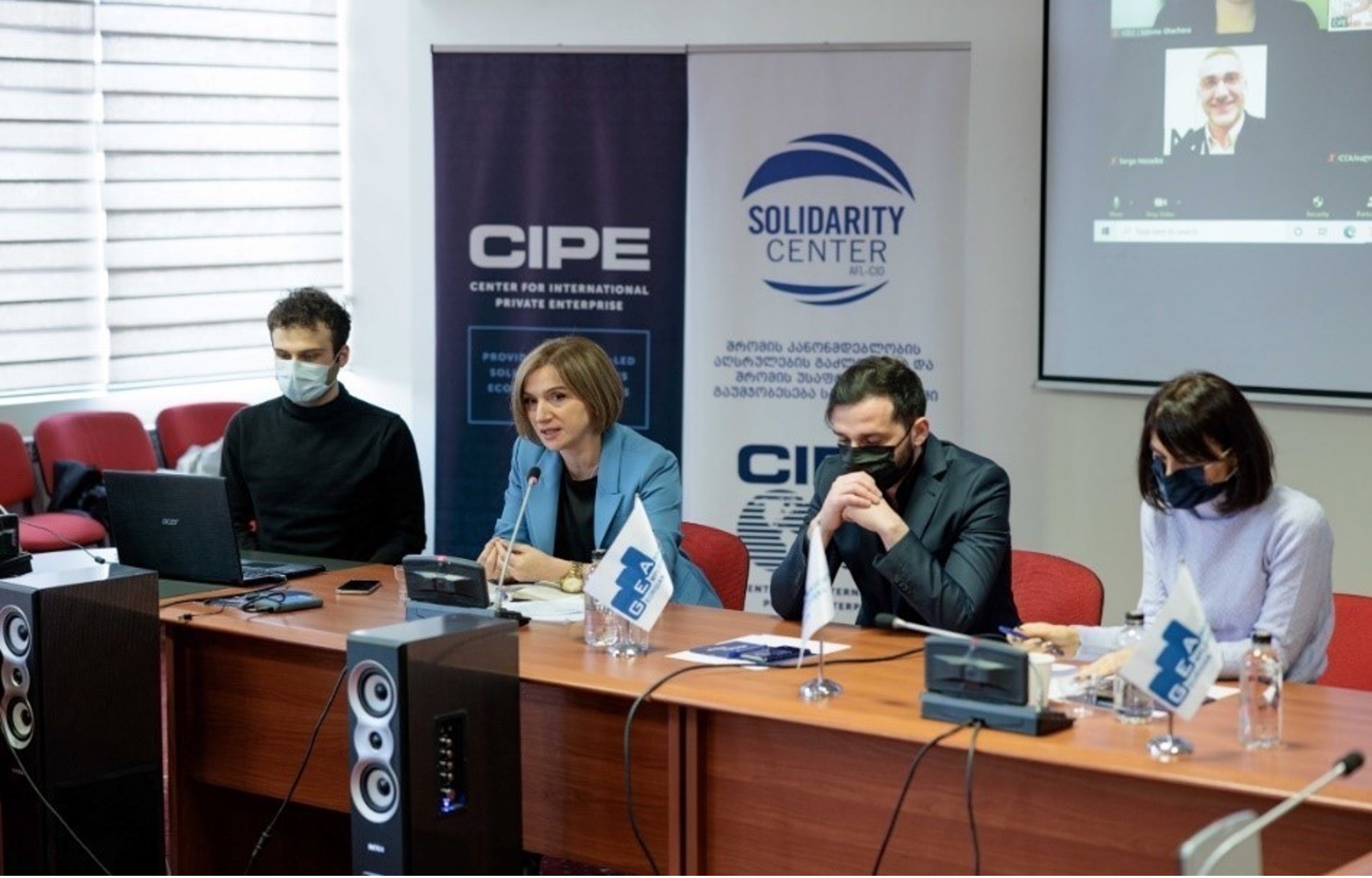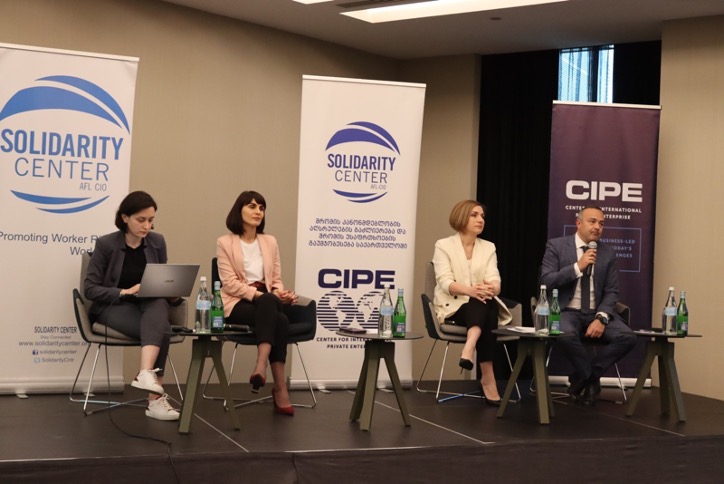As Phase 1 of the “Engaging Workers and Civil Society to Strengthen Labor Rights Enforcement” project closes, the Center for International Private Enterprise (CIPE) looks forward to continuing its work with the Georgian business community during Phase 2 of the project which launched in early October 2023.
Over the past three years, CIPE, in partnership with the Solidarity Center, worked closely with workers and 70 business associations to raise awareness about Georgia’s 2018 occupational health and safety (OSH) law and subsequent reform. While CIPE ensured the inclusive participation of businesses, the Solidarity Center assumed responsibility for employee engagement, contributing to best practices for social dialogue in the country. Through this partnership, CIPE successfully fostered closer cooperation and trust between employers and workers to improve compliance with recent labor safety reforms in Georgia.
To kick off the project, CIPE organized various awareness-raising sessions on the new labor reforms and launched a small grants program with business associations to further spread awareness of the updated legislation. As a result of these trainings, over 200 companies made substantial changes to their internal policies to comply with the new laws.

CIPE also utilized social media to reach a wider audience through a Facebook group that currently has 2,500 members. Since its launch, the platform has engaged over 50,000 individuals, allowing them to exchange experiences and discuss problems related to the implementation of labor legislation. CIPE also regularly disseminated accessible research, knowledge, and tools to the group, ensuring that critical information on labor law compliance reached more rural regions of Georgia as well as urban centers.
Following this information sharing campaign, CIPE worked to promote a culture of dialogue between workers and employers by tailoring its internationally recognized best business advocacy practices, including coalition building, grassroots outreach, and business-led policy platforms, to the Georgian context. CIPE applied these standards during roundtable discussions held with businesses and trade unions which successfully built mutual trust and facilitated a joint dialogue on addressing OSH compliance.
Throughout the project, CIPE worked closely with the Economic Policy Advocacy Coalition (EPAC), a coalition of business associations, chambers of commerce, and economic think tanks, founded in 2015 through CIPE support to facilitate dialogue between the private and public sectors and cultivate a business-friendly environment in Georgia. EPAC gained attention from various Georgian news outlets following a meeting organized by CIPE with the Sector Economy and Economic Policy Committee of the Parliament of Georgia. There, members of EPAC’s newly formed working group on labor issues engaged in an open dialogue on implementation of the labor code with government officials, improving relations between these stakeholders and opening the door for future advocacy activities.
To further develop social dialogue around the new labor regulations and labor code, CIPE brought together members of the EPAC working group to develop their knowledge of policy advocacy, the legislative framework in Georgia, and relevant international case studies. After exchanging their experiences and determining the main issues related to labor law compliance, working group members brought forward policy recommendations to address the key challenges they identified.
Research was then conducted by a European law and integration expert on the working group’s highest priority issue, the recording of working time, to strengthen the group’s advocacy efforts. The resultant recommendations were then presented by business organization members of the EPAC working group to the Deputy Minister of Labor, Health, and Social Affairs. During this meeting, changes to the regulation of working time were agreed upon and the corresponding federal act was amended just five days later. Due to this change, tracking working hours has been simplified for businesses while maintaining the labor rights of employees.

CIPE’s efforts to raise awareness of the updated Labor Code over the past three years have yielded considerable results, particularly through its events to increase the business community’s understanding of labor safety and labor rights, public-private dialogues, and successful policy advocacy efforts. However, greater understanding of employers’ obligations under the law in rural areas of Georgia and systematic regional dialogue are needed. While CIPE has increased cooperation between the business community and relevant government representatives under the previous phase of the project, the public sector still lacks sufficiently sustainable connections to work effectively with the business community and improve labor compliance.
In light of these challenges, CIPE and the Solidarity Center are thrilled to announce the launch of Phase 2 of the “Engaging Workers and Civil Society to Strengthen Labor Rights Enforcement” project. This second phase will build upon the successes of the previous iteration while also working to develop inclusive and sustainable solutions to the dynamic challenges associated with labor law compliance in Georgia. CIPE and its local partners are eager to progress this crucial work in Georgia by continuing to develop accessible awareness-raising materials, offering information sessions to private sector representatives throughout rural areas of the country, and engaging government representatives in meaningful dialogue throughout the next two years.
During a time of geopolitical hardship, political polarization, and growing emphasis on environmental, social, and governance standards among transatlantic allies, supporting the Georgian business community in achieving strong labor compliance has become essential for companies seeking to attract constructive capital and join global supply chains. Moreover, the effective implementation of the labor safety law and labor code is critical for Georgia’s further integration into European and Euro-Atlantic structures and serves as a prerequisite for membership in the European Union, which Georgia was granted candidate status for in December 2023.
CIPE has already begun work on this initiative and will continue to share success stories and lessons learned throughout the duration of the project. As we move forward, our aim is to continue to strengthen labor compliance in Georgia, contributing not only to the welfare of workers and businesses but also to the country’s broader socioeconomic development and its place on the global stage.
Funding is provided by the United States Department of Labor under cooperative agreement number IL-32531-18-75 K, through a sub-award from the Solidarity Center. 100% of the total costs of the project or program is financed with federal funds, for a total of $684,000. This material does not necessarily reflect the views or policies of the United States Department of Labor, nor does mention of trade names, commercial products, or organizations imply endorsement by the United States Government.
Published Date: January 25, 2024
